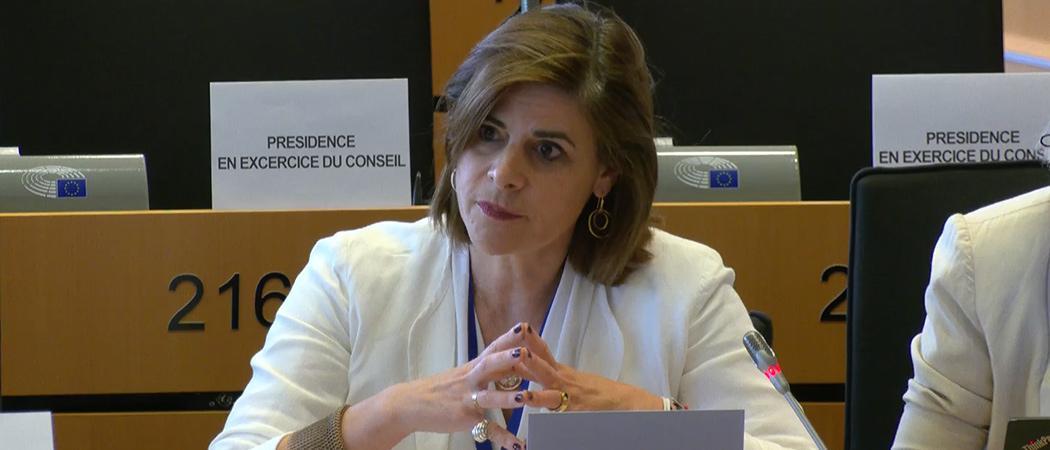Preparations for the second half of Horizon Europe, review of the programme to date and a full assessment of the Horizon 2020 predecessor are to start next month. A joint consultation on all three starts in November

Anna Panagopoulou, director for European Research Area & Innovation at the European Commission, defended the rollout of the EIC in front of MEPs. Photo: Screen capture from the Parliament’s webstreaming service
The European Commission is about to embark on assessments of the EU’s research programmes, guided by a joint consultation with stakeholders opening in November.
Three tasks on the agenda are a new strategic plan for the current €95.5 billion Horizon Europe research framework, which will guide the last three years of the programme; evaluation of the first half of Horizon Europe; and the final assessment of the previous research programme, Horizon 2020.
“For all these exercises, in the spirit of co-creation and openness, we are going to consult member states and stakeholders,” said Anna Panagopoulou, director of the European Research Area and Innovation at the Commission’s directorate for research. “We are not going to have three consultations in parallel. We are going to launch between November and February a consultation with stakeholders for all these three activities.”
Taken together, this will inform the direction of European research policy reaching as far as the next framework programme, due to start in 2028.
Panagopoulou outlined the Commission’s agenda at a conference organised by the European association of Research and Technology Organisations (EARTO), where eleven speakers reflected on the state of Europe’s research policy in today’s uncertain environment. The EU is facing an energy crisis, there’s a war on its front door and a climate disaster is approaching. Research and innovation will play a key role in addressing these challenges, but that may well spell changes to programming.
Speaking at the event, Christian Ehler, member of the European Parliament, called attention to the disconnect between EU member states’ praise of R&I as an answer to the challenges they face and the lack of tangible commitment to support and fund science.
Over the years, the European Parliament has been a fierce defender of the EU’s budget. This year, it’s once again vowing to reverse cuts proposed by member states. But Ehler says these battles cannot go on. Reversal is not enough; it must be understood clearly that without research the EU cannot achieve climate neutrality and its other political goals.
He invited research organisations to change the narrative around the budget discussions and spell out what is at stake. “We really should go out and say we don’t want to have money for research and innovation: we want to have money so that this is going to work. Otherwise, the political agenda of the EU is simply going to fail,” said Ehler. “Without the link between European industry and [research and technology organisations], all the regulatory efforts and the 2030 goals are not achievable.”
Research organisations have leverage here, as the world plunges into successive crises. “It becomes more and more clear how dependent politics become on innovation,” Ehler said.
Budget stability and simplification
Verena Fennemann, head of Fraunhofer EU Office, listed the leading German research organisation’s main concerns for the interim evaluation.
The first concern, unsurprisingly, is the annual fight over the budget. It’s customary for member states to cut the research budget and for the Parliament to fight back, but this year’s proposed €663 million cut is worryingly big. “For us as a [research and technology organisation], it’s challenging. We’re worried it’s getting worse every year,” said Fennemann.
On top of the budget cuts, the European Commission keeps starting new programmes and setting new priorities. Most recently, the Chips Act and the New European Bauhaus initiative were added to the mix, both of which are to receive funding from the overstretched EU framework programme. While flexibility is needed and welcome, “It creates instability because [moves] money [to actions] which are not R&I related,” noted Fennemann.
Another issue is the so-called simplifications that counterintuitively add more complexity to the daily tasks of research organisations. Fennemann says the bigger budgets for projects under Horizon Europe compared to Horizon 2020 mean that more partners are added to projects and more time and resources must be spent on coordination, which does not add scientific value to the projects.
Lastly, Fennemann is concerned about the balance in technology readiness levels (TRLs) across Horizon Europe. Low TRL projects are being shifted to partnerships, which are often led by industry that prioritises higher TRLs. Fennemann believes the Commission should make sure the balance is there, suggesting research and technology organisation representatives are placed on partnership boards to defend the balance.





 A unique international forum for public research organisations and companies to connect their external engagement with strategic interests around their R&D system.
A unique international forum for public research organisations and companies to connect their external engagement with strategic interests around their R&D system.